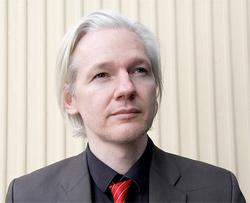I’ve become a Julian Assange man. Leak away, Julian. Leak it all, leak everything. Leak whatever you can until they find a way to shut you down for good.
At first, I was not sure how to feel about the recent dump of classified documents at WikiLeaks. I could see the arguments on both sides. I understand that we are the owners of a flawed and imperfect world within which no one owns a pair of those proverbial clean hands. No, we have a dirty world of infinite compromise. We muddle through, more or less, and the women and men who do the muddling, at the international level, are, more often than not, engaged in a tricky business. Human beings have a hard enough time being moral agents. For nation states, the task is well nigh impossible. And yet, wars are, sometimes, averted. Catastrophes are met with coordinated action. Relatively more dangerous countries are kept in check by relatively less dangerous countries. A global civilization manages, if nothing else, to persist. Bravo to the individuals who make this so, some of whom are the very members of the international diplomatic corps whose private and sometimes catty emails were just published for the world to read.
With these diplomats in mind, there are a myriad of well-reasoned arguments as to why WikiLeaks puts diplomatic missions in danger, threatens global stability, promotes the very secrecy it seeks to eradicate, etc. You can, in fact, find some of these arguments in a December 3 op-ed in the New York Times. It was written by Wolfgang Ischinger, himself a diplomat, chairman of the Munich Conference, former deputy foreign minister to Germany, and a participant in the negotiations around ending the war in Bosnia and establishing an independent Kosovo. As far as I know he’s a decent man. In his op-ed, he makes the point that “international crisis management and crisis prevention are among the nobler tasks of modern bilateral and multilateral diplomacy.” And who are we to dispute the claim? To Mr. Ischinger, WikiLeaks is a danger to the noble task of diplomacy insofar as the trust that is required in such ventures has been compromised. “Once trust has evaporated, it is difficult, sometimes even impossible, to rebuild.” That’s why Ischinger titles his piece as a question: “The End of Diplomacy as We Know it?” He claims that the leaks are about much more than “hurt egos.” “This is more serious: It is about war and peace, and it can be about life or death.”
And that is where Ambassador Ischinger lost me for good. That is where I went over to the other side, where I became a Julian man. There is only so much bullshit that any man can ingest, and I’ve been topped off. Mr. Ischinger is in the same lineage as all the noble men and women who have been managing the competing interests of war and peace for the last few hundred years. They have armed nations, and then disarmed them. They’ve left regions to stew and boil in endless carnage in the name of a greater stability. They’ve arrayed armies of invasion in other instances when the powers that be deemed it appropriate. From Klemens von Metternich to Wolfgang Ischinger, we’ve been told that the secret doings of this management of peace and war is at the service of a greater order and well being. The Hobbesian nightmare of the state of nature, a war of all against all, is continually gestured to as the price of giving up on the obscure ways of the diplomatic art. We need them, these architects of peace and war.
And yet we know, we have always known somewhere in our hearts, that this is the bullshit of the powerful. Necessary bullshit, perhaps. A bullshit to which we have no better alternative. But I won’t be told that I have to take my bullshit and like it. That I have to suffer the lies and manipulations of the great maestros of war and peace and smile and thank them for it. I want, at least, to be served my helping of bullshit with a side of discontent. I want to be displeased about the lies and the duplicity and the cynicism. I feel better knowing that the diplomats know that we know. This is a thin victory, even a little bit spiteful. It does not, pace the rather grandiose claims of Julian Assange, lead to a better and more honest world. I suspect we simply have no idea what the final impact of WikiLeaks will be, good, bad, or indeterminate. Probably indeterminate. But damn if the raw glimpse of truth didn’t feel refreshing. The sweat of men like Wolfgang Ischinger cleanses us all. Their worry gives us a little more strength to trudge on ever forward into the next war, the one which they are surely planning even now, with fewer emails, and as secretly as they can. 6 December 2010




